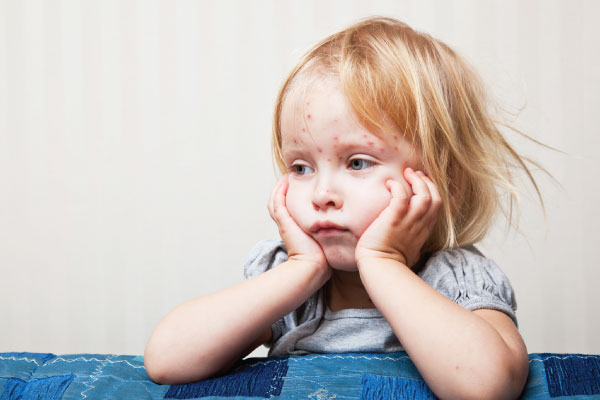Measles is a highly infectious virus that spreads easily from person to person through the air, through breathing, coughing and sneezing. Although measles is largely considered a disease of children, it affects people of all ages.
Once an individual is exposed to and infected with the measles virus, the first symptoms will not appear for eight to 12 days, known as the incubation period. Infected persons tend to be contagious for one to two days before symptoms finally emerge, and three to five days before the rash breaks out. This period continues for four days after the rash appears.
Prior to the appearance of the rash, people with measles develop cold-like symptoms, including a cough, runny nose, fever and inflamed red eyes. These tend to get worse during the first three days of the illness.
After a person has been ill for about two to three days, the rash will finally become visible. It usually begins on the face and neck, and then spreads to the torso, arms and legs. It lasts for five to eight days before it begins to go away. Complications of measles most often occur in patients under age five and over age 20. Pneumonia is responsible for 60 percent of deaths associated with measles. In a few, it is complicated by encephalitis.
Measles during pregnancy may be severe, mainly due to primary pneumonia. The disease is associated with a risk of miscarriage and prematurity, but congenital anomalies of the foetus have not been described.
Measles was an important cause of infant and young child morbidity and mortality in Bahrain. In the pre-vaccine era (1966–1975), more than 2,000 measles cases occurred yearly. Following the introduction of a monovalent measles vaccine in 1974, a second dose in 1985 given as a combined measles, mumps, and rubella (MMR) vaccine, and MMR vaccination campaigns in 1998–99, immunity to measles has risen considerably.
So far in the 2014 measles outbreak in Bahrain, 32 cases were registered of which 27 were among children under 15 years and five among adults. Of the total, 14 cases were detected among expatriates.
During a measles outbreak, you are at risk of getting measles if you have not been immunised. Passive immunisation with intramuscular immune globulin within six days of exposure can be used in selected circumstances to prevent transmission or to modify the clinical course of the infection.
Immune globulin therapy is recommended for susceptible individuals, who are exposed to measles and who are at high risk of developing severe or fatal measles. This includes individuals who are being treated with immunosuppressive agents, pregnant women, infants less than one year of age and those with HIV infection. Immune globulin should not be used to control
measles outbreaks.
Measles vaccination given to susceptible contacts within 72 hours of exposure as post-exposure prophylaxis may protect against infection and induce protection against subsequent exposures to measles. Vaccination is the intervention of choice for susceptible individuals older than 12 months of age, who are exposed to measles and who do not have a contraindication to measles vaccination. Active rather than passive immunisation is the strategy of choice for controlling measles outbreaks.
Although measles vaccine is manufactured in chick embryo cell culture, the vaccine has been shown to be safe in people with egg allergy; so they may be vaccinated without first being tested for egg allergy.





































